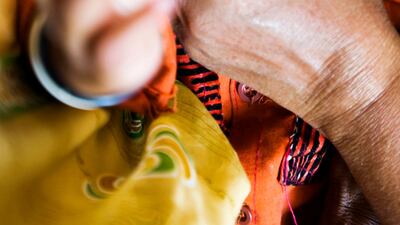When the Kerala state government launched a vaccination drive against measles and rubella earlier this month, Shimna Azeez took her two children to be immunised. Not only that but she made sure she broadcast live video of the vaccinations on Facebook.
Ms Azeez, a 29-year-old doctor living in the town of Kozhikode, said it was important for other people to see that her children were being immunised: “Maybe when they see that … we are doing this without any fear, people will be less suspicious and take their kids to get vaccinated.”
Over the past four or five years, Ms Azeez said, a mistrust of vaccinations has been growing in the southern Indian state, prompted by alarmist social media posts, WhatsApp forwards, and other material that she calls “propaganda”. The mistrust is particularly severe in districts with large Muslim populations in the north of the state, such as Malappuram and Kozhikode.
Last year, according to statistics from the Kerala government, 30 per cent of children between the ages of 0 and 5 in Malappuram were found to have never been vaccinated — the highest figure of all districts in the state. Muslims make up roughly 65 per cent of Malappuram’s population.
"People in general, of any religion, are being misled into thinking that vaccines cause autism, or that they're being administered just for profit," Ms Azeez told The National. "But with Muslims, what this misinformation on social media is telling them is: There's a hatred of Muslims in society, and these vaccines are a secret way to depopulate districts of Muslims."
_______________
Read more:
Dispelling fears and suspicion in Pakistan's polio fight
Editorial: Vaccines save children's lives
Pakistan's fight against polio clashes with battle against Taliban
_______________
This reluctance to vaccinate children is having deadly consequences. Over the past year, Malappuram has experienced a wave of outbreaks of diphtheria, a disease easily prevented by vaccination. Of the 533 cases of diphtheria reported from 11 Kerala districts in 2016, 229 were in Malappuram and 190 in Kozhikode.
Roughly 83 per cent of Malappuram’s diphtheria cases were found to occur in Muslims. For Kozhikode, where two-fifths of the populations is Muslim, the corresponding figure was 61 per cent. Two children died of the disease in Malappuram last year.
“Even a few infections are enough to pose a danger,” Ms Azeez said. “If your child isn’t vaccinated, he could give a pregnant lady rubella, and her child might then be born deaf or blind or with congenital heart defects. It’s a lifetime burden.”
A year ago, as diphtheria cases were mounting, Ms Azeez and 24 other doctors launched Info Clinic, a Facebook page with the motto: “The cure for ignorance is balanced knowledge.”
On the page, which is followed by nearly 50,000 people, the doctors try to dispel myths about modern medicine. But even under these posts, Ms Azeez sees disbelieving comments that make her despair. “If small-pox vaccinations were going on now, I don’t think we’d be able to eradicate it,” she said. “That’s the state of affairs.”
Among those who remains unconvinced is Ahmed, a 42-year-old tailor in Kozhikode who didn’t wish to have his last name published. Last year, Ahmed remembered, he was forwarded numerous text messages that outlined the dangers of vaccination.
Sometimes the messages didn't say who had written them. Other times, they claimed to be generated by a body called the International Human Rights Association (IRHA) or by the Jamaat-e-Islami, a religious organisation.
The Jamaat-e-Islami has since reversed its stand on vaccinations, urging people to get them. But the IRHA, which claims spuriously to be working with the United Nations, continues to spread its messages. In August, NP Prasad of the IRHA insisted in a post on a blog called "Vaccination Kerala" that people “do not know the true story” behind immunisations, and that children constantly fell ill or died after receiving vaccinations during health drives.
“When you get messages like that, you get frightened for your children,” Ahmed said. “You think: ‘Better I do nothing, because doing something may just harm my children, whereas they are fine right now without it.’”
During Kerala's current measles-rubella vaccination drive, which was launched two weeks ago, social media posts have emerged, urging people not to get their children immunised. One frequently shared Facebook post claimed the vaccine “will harm the natural immunity of children. Measles and rubella are not severe diseases for children. It comes with a fever and then goes”.
Kerala’s government officials have promised to crack down on those spreading misinformation about the state’s health campaigns.
“There is false propaganda against the vaccination drive,” K K Shailaja, Kerala’s health minister, told reporters last week in Malappuram. “Certain people still hold on to superstitions. But we are trying to overcome the situation by enlightening people. Besides, strong action would be taken against those creating panic among the people.”
Such action has already been taken against at least one person. In the district of Kottayam last week, police questioned a man, identified only as Sebastian, for claiming in social media posts that five school students had fainted after being immunised.
Sebastian, who claimed to be an IRHA member, said he had kept his son away from his school’s vaccination drive. But as of yet, no charges against Sebastian or the IRHA have been officially registered.

